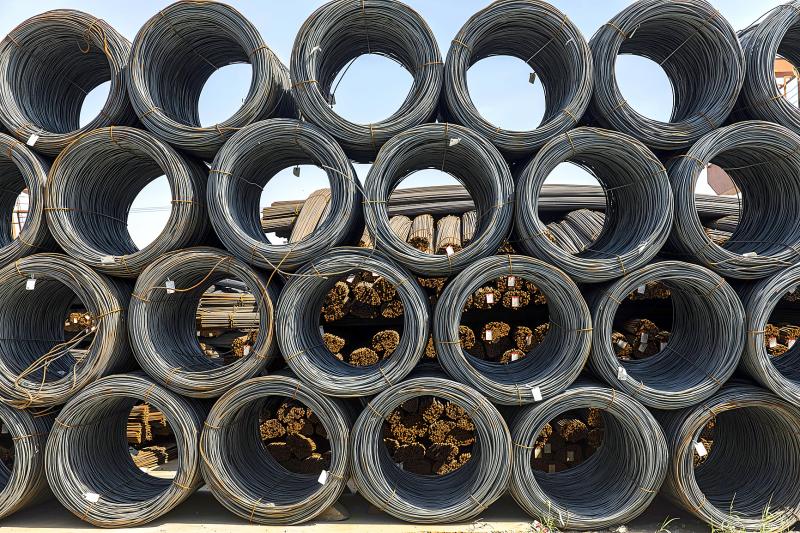China Steel Corp (中鋼), the nation’s biggest steelmaker, yesterday said that it would not be raising prices for some products next month, ending 12 consecutive months of increases.
“There is a discrepancy between China Steel’s prices and international prices, but in consideration of price stability, we have decided not to adjust upward monthly-priced products,” the company said in a statement.
That means the price of hot-rolled steel plates, hot-rolled steel coils, cold-rolled steel coils and other monthly-priced items would not change next month.

Photo: Qilai Shen, Bloomberg
However, the cost of other items priced seasonally would be going up, the company said, adding that prices of products would be raised by 4.1 percent on average.
Prices of steel plates for the shipping industry would be raised by NT$2,000 per tonne, while prices of high-carbon hot-rolled steel plates, automotive steel, cold-rolled coils and hot-rolled coils would be raised by NT$2,900 per tonne, the company said.
“The accumulated gains in the global market for seasonal products demanded a reasonable adjustment to bring domestic prices closer to global market prices,” China Steel said.
Given the severe shortage of materials downstream consumers are experiencing, the company announced that it would “allow the appropriate imports of steel materials to solve the shortage.”
The statement also said that climate change and carbon taxes are becoming a global trend, and domestic buyers should take carbon neutrality costs into account going forward.
“Starting from next year, China Steel plans to add environmental costs such as carbon fees to our export orders,” the statement said. “The steel industry must respond to the global trend to decarbonize and calculate the carbon footprint of its products.”
“China Steel suggests that downstream companies prepare for the changes that are to come,” it added.

SEMICONDUCTORS: The German laser and plasma generator company will expand its local services as its specialized offerings support Taiwan’s semiconductor industries Trumpf SE + Co KG, a global leader in supplying laser technology and plasma generators used in chip production, is expanding its investments in Taiwan in an effort to deeply integrate into the global semiconductor supply chain in the pursuit of growth. The company, headquartered in Ditzingen, Germany, has invested significantly in a newly inaugurated regional technical center for plasma generators in Taoyuan, its latest expansion in Taiwan after being engaged in various industries for more than 25 years. The center, the first of its kind Trumpf built outside Germany, aims to serve customers from Taiwan, Japan, Southeast Asia and South Korea,

POWERING UP: PSUs for AI servers made up about 50% of Delta’s total server PSU revenue during the first three quarters of last year, the company said Power supply and electronic components maker Delta Electronics Inc (台達電) reported record-high revenue of NT$161.61 billion (US$5.11 billion) for last quarter and said it remains positive about this quarter. Last quarter’s figure was up 7.6 percent from the previous quarter and 41.51 percent higher than a year earlier, and largely in line with Yuanta Securities Investment Consulting Co’s (元大投顧) forecast of NT$160 billion. Delta’s annual revenue last year rose 31.76 percent year-on-year to NT$554.89 billion, also a record high for the company. Its strong performance reflected continued demand for high-performance power solutions and advanced liquid-cooling products used in artificial intelligence (AI) data centers,

Gasoline and diesel prices at domestic fuel stations are to fall NT$0.2 per liter this week, down for a second consecutive week, CPC Corp, Taiwan (台灣中油) and Formosa Petrochemical Corp (台塑石化) announced yesterday. Effective today, gasoline prices at CPC and Formosa stations are to drop to NT$26.4, NT$27.9 and NT$29.9 per liter for 92, 95 and 98-octane unleaded gasoline respectively, the companies said in separate statements. The price of premium diesel is to fall to NT$24.8 per liter at CPC stations and NT$24.6 at Formosa pumps, they said. The price adjustments came even as international crude oil prices rose last week, as traders

SIZE MATTERS: TSMC started phasing out 8-inch wafer production last year, while Samsung is more aggressively retiring 8-inch capacity, TrendForce said Chipmakers are expected to raise prices of 8-inch wafers by up to 20 percent this year on concern over supply constraints as major contract chipmakers Taiwan Semiconductor Manufacturing Co (TSMC, 台積電) and Samsung Electronics Co gradually retire less advanced wafer capacity, TrendForce Corp (集邦科技) said yesterday. It is the first significant across-the-board price hike since a global semiconductor correction in 2023, the Taipei-based market researcher said in a report. Global 8-inch wafer capacity slid 0.3 percent year-on-year last year, although 8-inch wafer prices still hovered at relatively stable levels throughout the year, TrendForce said. The downward trend is expected to continue this year,